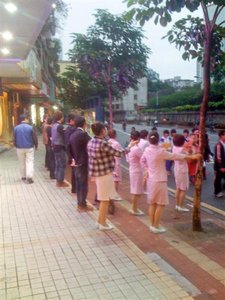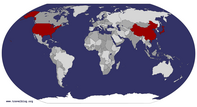Advertisement
Published: April 10th 2010

 Hairdresser's Shape Up
Hairdresser's Shape Up
I had my haircut at this local hairdresser a few weeks ago. Recently, while walking home one evening, they were out on the sidewalk doing a dance routine while the loudspeakers reverberated with the sounds of bad Chinese rock and roll (is there any other kind?)04092010 Blog
Part of our new experience here this year has been the sharing of He Gao Chao’s apartment. He is a professor at Sun Yat-sen University and has been a strong ally of Ellen’s in her efforts to collaborate with Chinese lab0r uni0ns. He has graciously offered us lodgings in his very comfortable apartment just off campus. As important, we have had opportunities for informal conversations about China, China and its relationships with the US, and matters of significantly less import.
His personal story reflects the recent history of China; he enrolled in one of the first classes when universities re-opened after the 10 year hiatus during the Great Proletarian Cultural Revolution (to give it its full name) in 1979. He went on to graduate school in the US where he obtained his Ph.D. and returned home to play a role in the New China. He has been an essential colleague for EDF in her work here and I have valued the insights he has helped give me, about the US as well as China, in our frequent dialogs.
Earlier this week we were discussing the attitude of many Chinese towards the Japanese; these are explicitly shaped

 Lao Shi Ellen
Lao Shi Ellen
Here is the "professor" in here element. We are each taking one week of an MSW class in Social Administration from our esteemed colleague, Agnes Law.by the horrors inflicted on China during the long Japanese occupation starting in 1931 and ending with the defeat of Japan in 1945. The Japanese, and their unwillingness to acknowledge their culpability from that period, are contrasted with the Germans and their much greater efforts to make some compensation (financially and otherwise) for their own unimaginable acts against humanity.
The periodic expressions of anti-Japanese sentiments are aroused by incredible Japanese insensitivity as well as a device of the government here to arouse nationalist fervor as a foil to demands for greater accountability. Visits to the Yasukuni Shrine by high ranking Japanese officials
, with its kami of Class A war criminals, is certain to get Chinese protestors on the street. Several years ago the demonstrators threatened the safety of the Japanese Embassy in Beijing, before being dispersed by security police. While the grievances of China are real and strike strong emotional chords in people as they are reminded of an era when China was victimized by many world powers, its current manifestations are manipulated by the government, protective of the important economic relationships that exist between the two countries while playing the nationalist card to divert attention from calls 
 Morning Group
Morning Group
Each morning along the Pearl River you will find gathered groups of people engaged in various group activities: dancing, Tai Qi, sword play, etc. Note the haze, combination of pollution and humidity that hovers in the high 80's constantlyfor domestic reform.
This inspired Gao Chao to discuss the issue of ethnic differences, especially as it appeared in the US. It was his contention that Americans are less interested in where you came from or “who your people are” then what you can get done. He experienced this first hand during his own sojourn in the US and views this as the great strength of America. On the other hand, he sees that American foreign policy has been hampered by this attitude, leading to a lack of understanding how ethnic differences fuel many of the world’s most searing conflicts. As a result these conflicts elude the best efforts of US diplomacy to get everyone join hands in a round of We Shall Overcome.
Ellen had a pair of Belgian uni0n activists in town this week and what better way to celebrate their arrival then our first non-Chinese meal since our arrival. Korean food is quite popular here and Sun Yat-sen University has a large number of Korean students studying Chinese, so there are a number of nearby choices. A few days later, she accompanied them on a trip to Shenzhen
for some industrial visits; one can 
 The Embedding of Social Work
The Embedding of Social Work
I visited this recently developed site for social work, a "hospital" for disabled veterans, actually more like a nrsing home. Social work has been present for the past year and has had a very important impact on the lives of these vets. The poster is located outside the two activity rooms used by the social workers, who provide the only sort of rehabilitative services for most of the patients.hardly think of a more selfless act than volunteering a trip to the desolate, semi-militarized industrial zone of Shenzhen, the region where the “New China” (read state capitalist) was born. Its sprawl, extending over nearly 800 sq. miles and home to 9 million, is a dystopic combination of cheap, fast, and ugly. She is a saint for the movement!
My class work received a jolt with last week’s publication of an article in New England Journal of Medicine on the diabetes epidemic in China. Authored by Chinese academics and clinicians it documented the seriousness of the condition and, most startling, the fact that 61% of those with diabetes did not know it! I decided to incorporate these findings into my medical Sociology/Medical Social Work classes and have students working on putting into practice some of what they have learned about social determinants of health and well-being. This is a challenge for them as their most practiced response to solving problems starts with “the government needs to do something”, a recognition that nothing of import happens without government approval and participation.
Today (April 4) I went out for a long run and was overwhelmed by the pollution. The sky

 Up and at 'em!
Up and at 'em!
Each morning we are greeted by the sounds from the nearby school yard, as the students are put through their drills at 7:30. The day extends until about 4, with a two hour mid-day break, when they are eating their lunch, as well as ors!was yellow with the detritus of industrializing China and the daily deposits of black soot on the window sills persist. At one point I was about 500 meters from a 50 story structure and could only see to the 30th floor or so. It is said that each year you spend in this environment cost you 30 days of life. Who knows what the equation is but the evidence of rising pulmonary disease is sobering. For a country just two generations away from the scourge of infectious diseases and early death there is an urgent need to face this new manufactured “infection”, which is rapidly undermining the heralded public health achievements of the Mao era.
There is some commitment to reducing the environmental burden: increase in wind and solar power (and I won’t mention the 9 nukes started in 2009), cutting by 50% the pollution per unit of GDP growth over the next 15 years, and adoption of EU/North American standards for auto pollution. The government argues that it is unfair to stifle their industrialization as all the developed countries went through similar periods of environmental degradation as they grew. They may have a point, but when the UK,

 Tidying up for the Asia Games
Tidying up for the Asia Games
There is hardly a street that is not under some for of reconstruction, even the small back alleys. for example, was industrializing they weren’t putting 30,000 cars on the road each day. In any event, if it weren’t for the friends and important professional connections we have made here over the years, I could bid a final farewell to Guangzhou. The air makes my throat sore, I am coughing a bit and rest easy only in the knowledge that I am on a plane back to the US in three weeks.
Another sort of pollution came up during my meetings with Medical Sociology students this week. Using the aforementioned article on diabetes in China, I have small groups using what they have learned to try to deepen their understanding of the social determinants of health. A group that is reviewing the role of food quickly recognized the affects of fast food, China’s membership in the WTO, and the breakdown of longstanding Chinese traditions about mealtime. They were flummoxed when considering the need to increase vegetables and fruit consumption; there had been a widely publicized story a few weeks ago when long beans, contaminated with an illegal pesticide, were found in Guangzhou markets. They declared that it is unsafe to eat the vegetables here and that they regarded

 Rolling out the scallion pancakes
Rolling out the scallion pancakes
Our early morning favorite, the oil laden, flaky, scallion flecked flat breads that are ubiquitous. Of late, I have been making that at home, saving ourselves from the heavy dose of vegetable oil that graces the "store bought" versionsthe food at foreign fast food restaurants safer, at least in that regard. Name your poison, artery clogging burgers and fried chicken, or pesticide laden vegetables (and tofu) from your local market. These things make China hard to bear at times, especially since they have shown themselves to be quite capable of world-class behavior. Behind all such incidents as this lurk the corrupt actions of (local) officials and the unwillingness of the authorities to interfere.
It gets much worse than this; some of the most heated confrontations come when local officials demolish the homes of people without notice and with minimal compensation. The usual scenario is that a cadre has made arrangements with some investor to build a factory and is well compensated by the developer for a quick removal of the inhabitants. Most appeals of these sorts of actions, which appear to be relatively commonplace, are fruitless. Higher administrative levels will not get involved and the courts take their orders from Party officials, who themselves are the beneficiaries of this corruption. The most worrying (to the government) demonstrations are those protesting these takings.
These protests are demanding that the laws against arbitrary takings be enforced and, as

 Medicalization
Medicalization
Cosmetic surgery is very big here, $20 billion spent last year in a country that lacks needed basic access for many. This became a theme in my Medical Sociology class and the discussions are still lighting up the email inboxes!was pointed out in a recent speech by a lawyer academic here, Chinese demands for justice often focus on enforcing the existing laws. This is contrasted to the US experience where protests are often focused on demanding that rights be respected. This is an important distinction to bear in mind as we contemplate the evolution of justice here n China.
Street Scene- Mom and dad in the front of a Chinese-brand mini-van, Dad smoking a cigarette, while Mom is clutching one of the flat-faced lap dogs so newly popular. In the back seat is the pre-teen daughter, with a two-fisted snack making its way to building her part of the New China. In one hand is a steri-pack of milk and in the other is some yellowish pastry that looks as if it was extruded out of a test tube.
Advertisement
Tot: 0.12s; Tpl: 0.026s; cc: 6; qc: 44; dbt: 0.0493s; 1; m:domysql w:travelblog (10.17.0.13); sld: 1;
; mem: 1.1mb















jean
non-member comment
scallion pancakes
Yum, we had the best in a small village outside beijing which david tried to duplicate here but they just werent quite the same. Boy, the contradictions, the good and the bad, of "progress". Jean Hello to Ellen